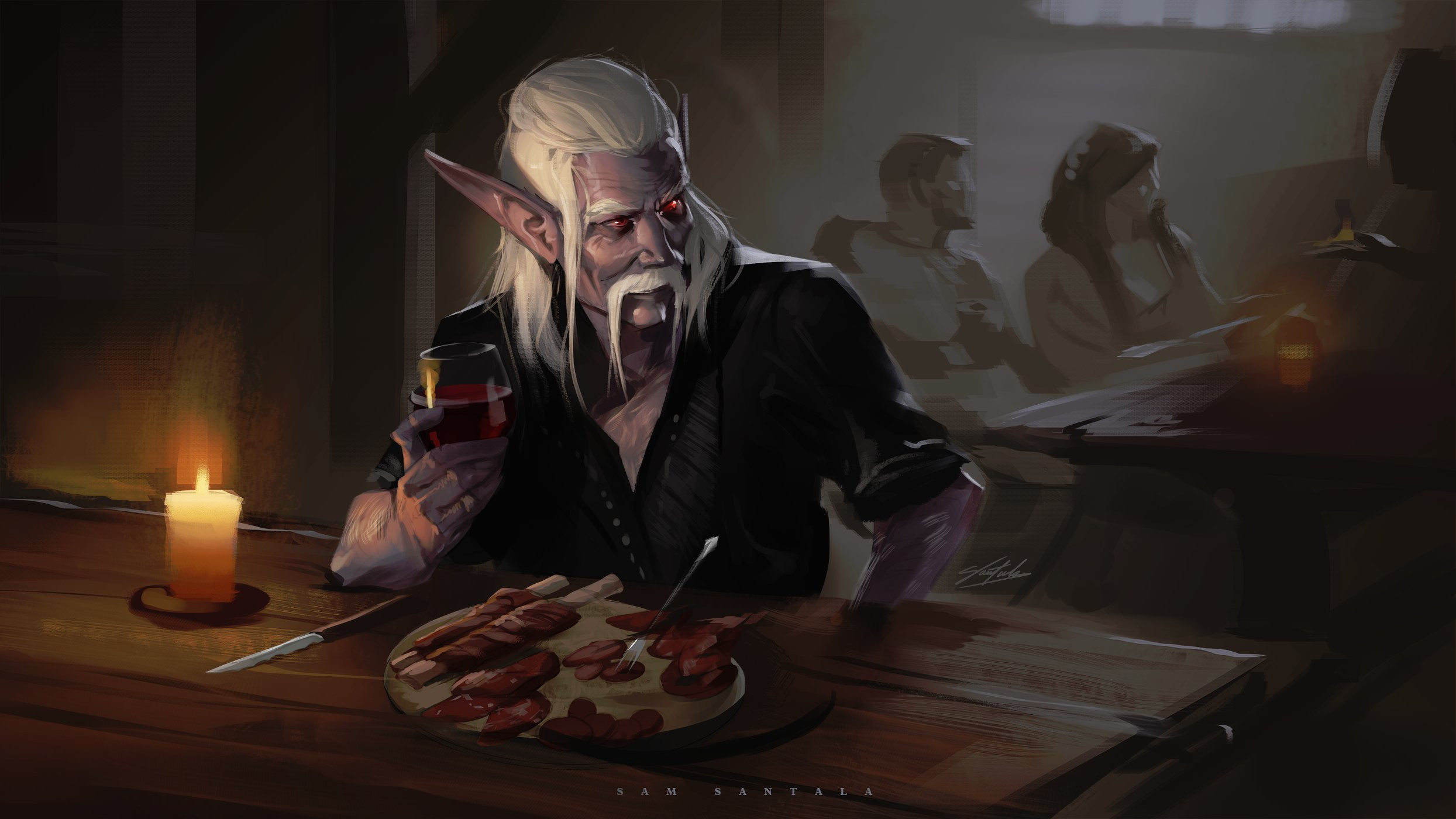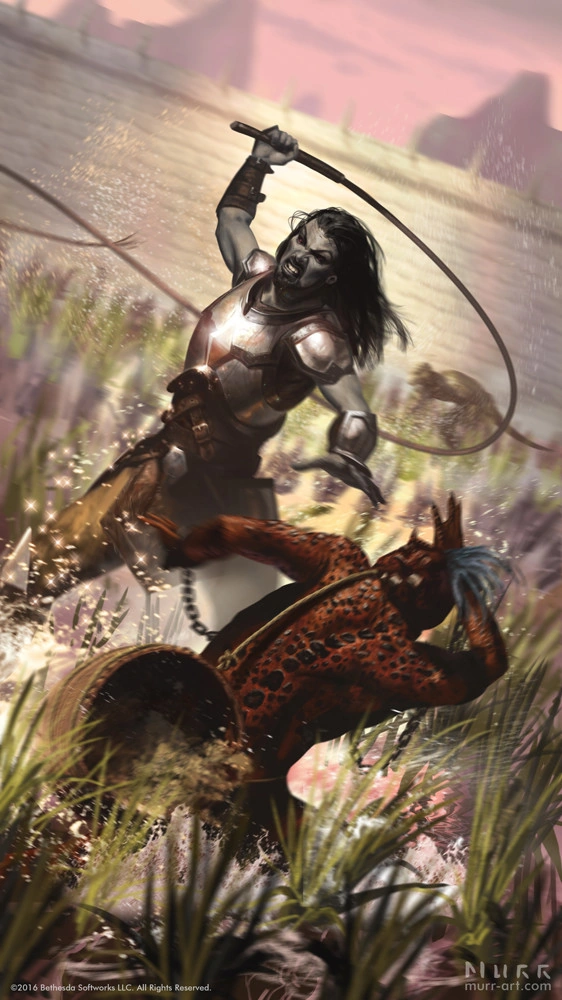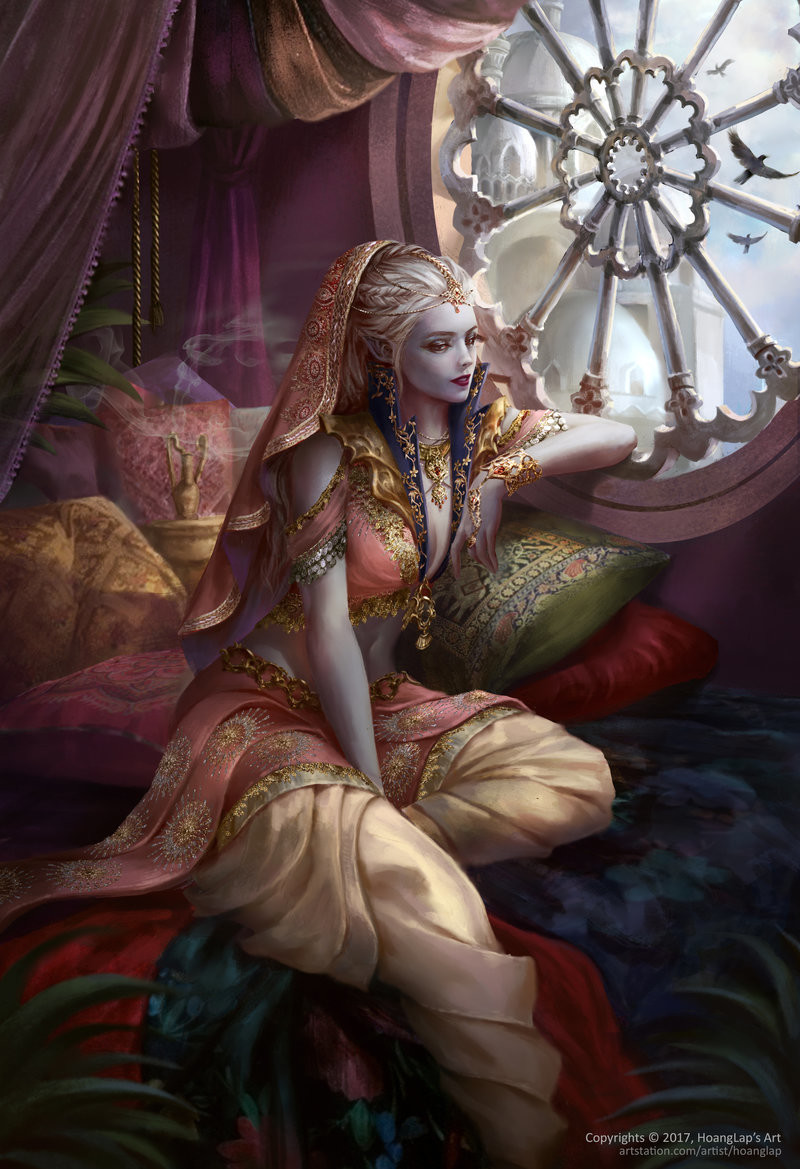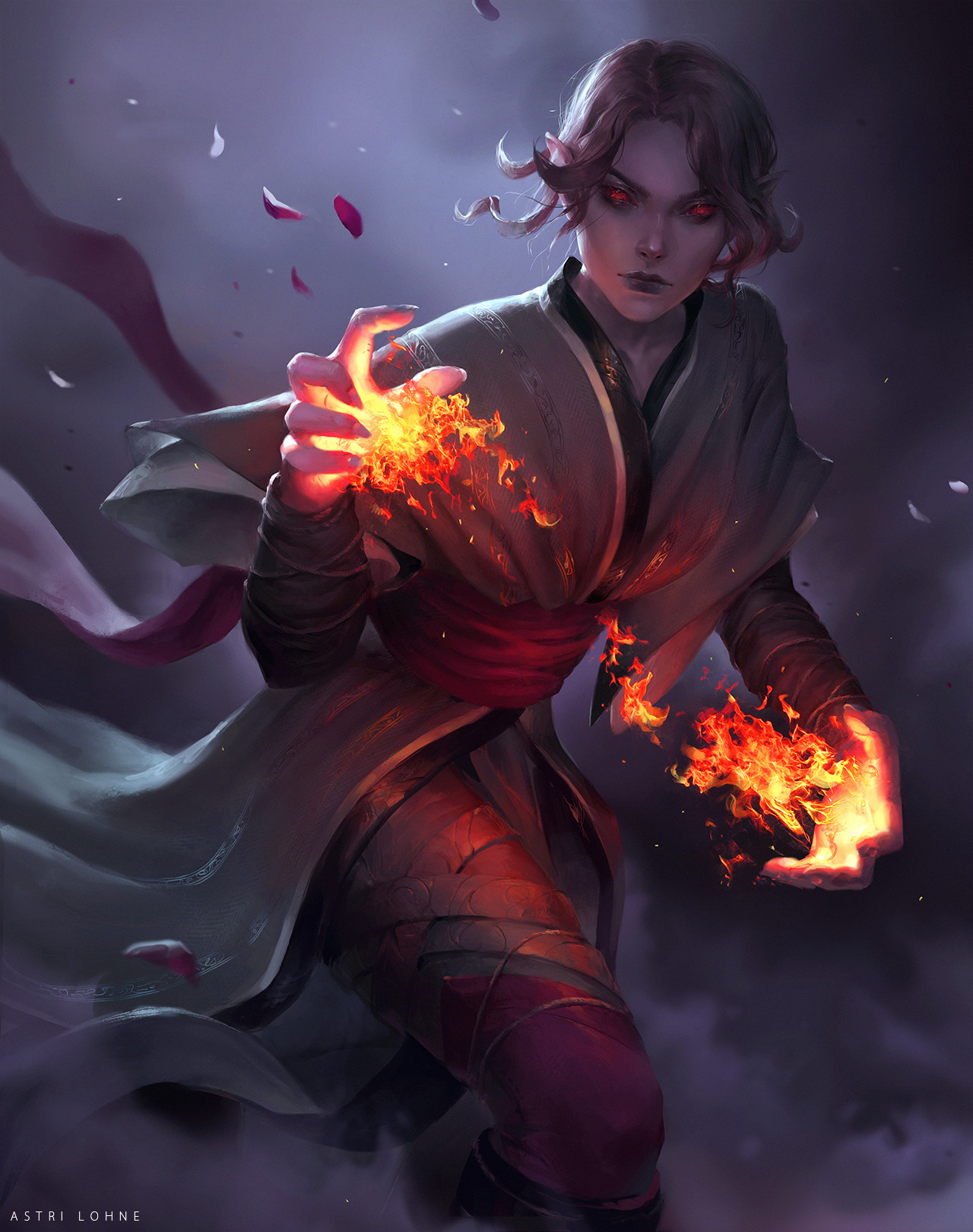Dark Elves
The Scorned Elves
Hailing from the militaristic Empire of Daeruin, the Dark Elves are blighted by a foul reputation wherever they go. They are a proud people who value family, their homeland, and tradition, while scorning outsiders and their machinations. Dark Elves are visually hard to mistake with their gray or black skin and burning red eyes. Their fierce pride and sense of superiority is expressed through a virulently hierarchical social structure with the great houses at the top and slaves at the bottom. While the rapid expansion of their empire brings with it new ideas and challenges to the social order, Dark Elven tradition is no fickle thing. They are a matriarchal culture, like most other elves of the region. Clan mothers lead their families, women manage and inherit all wealth, property, and lands, and men are often left to inherit nothing. For this reason, many Dark Elven men leave their homeland to become adventurers. Religiously, the Dark Elves are quite unique in their approach to the gods. Aligning themselves with The Infernal Order along with their ancestors, they see their gods in an adversarial manner, as challenges to overcome. The gods grant the most worthy of the Dark Elves boons and receive their worship in exchange. As such, it's best described as a transactional spirituality. Many of these elements of their culture leave the Dark Elves scorned and vilified by most of the other races of Sol. Naturally, the feeling is mutual.Slave Raiders
The reputation of the Dark Elves is marred by their severe matriarchy, brutal conquests, and infernal worship, but perhaps no aspect of their culture earns them more scorn than slavery. While it should be noted that slavery was not a Dark Elven invention or peculiarity, the people of Daeruin have turned the institution into an art form. It is such a vital aspect of their culture and economy that in Neirath, the great capital of the Empire, it is suggested that slaves make up a more significant share of the population than free people. In the far-flung southern lands, slaves work the lands of their seized homelands, producing cash crops such as sugar, coffee beans, tobacco, spices, and other exotic goods under the watchful gaze of the Dark Elves. On the mainland, slaves serve as domestics, laborers, bodyguards, soldiers, sex slaves, and eunuchs. While many cultures practice slavery in one form or another, nowhere on the continent is it as entrenched or widespread as with the Dark Elves. Many races find themselves put in bondage including goblinoids, Humans, Orcs, Dwarves, Catfolk, and, of course, Snow Elves. Generations of raids into Mistvall has resulted in a slave race of Snow Elves in Daeruin which has persisted for so long and under such brutal conditions, that these slaves have begun to culturally diverge from their ancestors distinctly enough to be considered their own culture variant of Snow Elves.A Dark Reflection
Despite some of these less charitable aspects of Dark Elven culture, it'd be a mistake to write them off as evil or less civilized than the other races. Plenty of Dark Elves are perfectly capable of kindness to others, including outsiders. It is worth noting that many Dark Elves who leave their homeland to adventure or settle in distant lands often find themselves the target of scorn, ridicule, discrimination, and persecution. In Dragoncliff, for example, the Dark Elves there dwell in the slums, much like the rest of the elven population, including the Snow Elves. At home, Dark Elven culture does place great value in many things which others may admire such as family loyalty, a strong sense of community, and respect for elders, including those of other races.Naming Traditions
Feminine names
Talesa, Hlaysa, Brevris, Dervliah, Baleth, Nadali, Bravosa, Athdiri, Arveera, Llauva, Vadoni, Eranea, Theliri, Eransi, Teridrala, Gadalia, Minleth, Urndura, Niryani, Tremdreri, Vulmsa, Eldrva, Darri, Traesa, Sorayna, Llenziah, Dinuthasa, Idrovona, Aphdresa, Nidala, Mirimsa, Aranvera, Dreymona, Narimea, Tenmeni, Mathdrasi, Andaleth, Varodroni, Noramea, Idromea, Drislara, Valas, Vedlia, Setulu, Nedeivah, Athefyn, Nolvyn, Sondmera, Thalra, Llanvon, Dreddera
Masculine names
Morvath, Ildrath, Talvath, Derarose, Kilhen, Viramir, Sadrus, Shalrius, Derayth, Balas, Voroth, Sathev, Hlandran, Malatis, Synhyr, Remath, Gadrys, Athendis, Navis, Druman, Dalaryn, Baledyn, Serheru, Tereth, Drelesu, Sadrelos, Ambryth, Dirathe, Maldrus, Temiar, Turasa, Ravadras, Vuvara, Taradryn, Nardros, Felmir, Sathdel, Reladrose, Ildothyr, Sanmir, Talindras, Sondrayni, Sadevul, Adaran, Marolas, Mirvdras, Vararyn, Dunela, Veroth
Family names
Vamoth, Dellu, Arvahi, Sererith, Bavahis, Daremyn, Falothi, Falsra, Dovethi, Sethules, Lleralas, Dilmthyn, Uvayith, Baluvi, Venovas, Dolorus, Hlaneloth, Drinndel, Ildathari, Nararam, Favhari, Areleth, Llarhandus, Indrel, Gavoth, Aramys, Nilvandas, Hlanus, Nitheloth, Draneth, Vidhari, Morven, Drilothi, Narolvel, Andrhi, Sethralo, Driltella, Drilendas, Indaoril, Nasith, Sadnith, Varalnim, Devarano, Virivion, Radeth, Saduni, Taldras, Melsrith, Mavathyn, Sedari
Culture
Major language groups and dialects
Dark Elves speak the Elven language. Their dialect is of the Northern Branch, which includes itself and Snow Elven.
Culture and cultural heritage
Dark Elven culture, while firmly elven, takes pride in being distinctive from that of their elven cousins. It is communal, focusing on extended family units, from parents to extended family to clan ties, a Dark Elf typically knows even distant relatives and takes an interest in them.
Shared customary codes and values
Dark Elves tend to be very religious, traditional, and family-oriented. They value family tradition and follow the tenets of their deities.
Common Etiquette rules
As a traditional culture, Dark Elves pay particular respect to elders, even of other races. When speaking to one of significantly older age, it's customary to remain quiet, reserved, and always willing to help, whether that'd be offering one's seat or grabbing a drink. Though in general, when interacting with those of similar status, Dark Elves are not known for being very boisterous or rowdy, they prefer reserved, shorter interactions.
Art & Architecture
Artistically, the Dark Elves are patrons of many art forms, they are known to widely enjoy shadow puppetry. Other forms of art such as pottery, jewelry, carvings, and devotional statues are popular as well. Though, as of late, the Dark Elves have gained a fascination for Shanraoan weaving, watercolor paintings, and ceramics, even their native tea ceremony has become part of Dark Elven high culture.
Funerary and Memorial customs
When a Dark Elf dies, it is customary to have a funeral within 24 hours, so as not to allow the spirit to run away and become an issue. Dark Elven funerary tradition varies somewhat by the clan and local tradition, but they always include the body being wrapped in a black shawl lined with sweet-smelling plants, being buried or put in the family tomb, and having a ceremony that will include extended periods of silence from the mourning family, sometimes for over a week. It is even customary for the spouse of the deceased to not engage in public life for a month or more, during which a close family member may bring them essentials.
Like most Elven cultures, ancestors are of utmost spiritual importance. Dark Elves who can afford it often have ornate and refined family tombs where the dead are put to rest. During many celestial events, it is not unusual for the family to descend into the tomb and use Angel's Trumpet, a drug common in Elven spiritual traditions, to commune with their ancestors.
Ideals
Beauty Ideals
Dark Elves value beauty and aesthetic. They will spend lots of money, resources, and time to beautify themselves from things such as braiding their hair, piercing their body, purchasing expensive garments, or gaining a better figure.
Gender Ideals
A matriarchal society, wealth, status, property, and inheritance goes through the female line, from the mother to her daughters, males often inherit nothing. Females are the head of the household, they often take refined occupations while males tend to take physical occupations. Due to these inheritance expectations, males often become adventurers as they have nothing to wait for.
Socially, women are expected to be shrewd, intelligent, and cunning. Men are expected to be more stoic and deferential, especially to the women of their families.
Courtship Ideals
Dating is virtually non-existent in the culture; instead, courtship is done with the supervision or even express manipulation of older relatives. Before marriage, arranged courtship will often take the form of chaperoned dates and meetings. During these, the pair will be expected to discuss their possible compatibility, skills, and plans for the future. It is considered entirely inappropriate for one to give the other a gift. In general, Dark Elves are strait-laced regarding courtship and affection.
Relationship Ideals
Dark Elven relationships are often characterized by a strong sense of security, they value stability over things like passion and love. Polyandry, the practice of a woman marrying multiple husbands, is socially and legally permitted though reasonably uncommon.
Parent ethnicities
Diverged ethnicities
Encompassed species
Related Organizations
Related Locations
With the influx of new resources and ideas from conquered lands, new tastes and ways of thinking have taken root among the Dark Elven elite.
On the battlefield, Dark Elves prefer a balanced approach of sword, bow, magic, and stealth. As such, they make excellent nightblades and spellswords.





